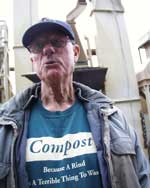John Dean is never still when he’s at his composting and recycling facility, tucked behind the airport in Anchorage, Alaska. Dressed in his usual baseball cap and a T-shirt that reads “Compost — Because a Rind Is a Terrible Thing to Waste,” Dean splits his days between the seat of a backhoe and his mobile-home office. One minute he’s loading chocolate-brown compost into a customer’s pickup. The next he’s yelling at a worker who’s scooping compost from the wrong row.

John Dean and his Sneetch-
starring machine.
“Hey, not that pile,” he shouts on a recent Saturday before sprinting over to tap the worker’s shoulder.
Dean then turns his attention to his brand-new glass crusher, which pulverizes glass containers, dumps the glass grit through a series of bucket conveyors, and runs it through sifting screens. He scoops up a golden handful and lets it run through his fingers. “Looks good,” he says, flashing a grin before dashing off to the next task.
Dean, 68, could be spending his retirement chasing balls around a golf course. Instead, the former engineer has chosen the challenge of turning Alaska’s trash into products that can be sold and used right here in the state.
“You’ve got to do what you like,” says Dean, who is trim and bespectacled and looks like somebody’s grandfather. “I don’t ever intend to retire. You need something exciting to do. That’s what keeps you alive.”
Dean’s latest excitement was designing a glass crusher. His contraption looks like something out of a Dr. Seuss book, something meant to put stars on the bellies of Sneetches. It has chutes and spouts; one of the machine’s crushers is fabricated from two used backhoe treads. But it works like a charm and is one of only four large-volume glass crushers in the country capable of making sandblasting grit to industry standards, Dean says.

A pain in the glass.
Anchorage residents use about 12,000 to 15,000 tons of glass containers annually. Dean expects to divert a substantial amount of that from the landfill and sell the resulting glass grit for sandblasting oil pipelines, ships, cars, and other machinery, cutting down on the need to import sand from the Lower 48.
Dean also expects to sell glass grit for construction projects, septic fill, and even road work. He might also polish some of the larger chunks and sell them for decorative purposes. Eventually, he hopes to recycle full bottles of beer and wine discarded by companies because the contents are too old. He has an idea to pump the liquid over to his rows of compost, to feed the microbes that make the soil. “We’ll get the bugs drunk,” he jokes.
Playing in the Dirt
Dean just started crushing glass last month, but founded the Anchorage Regional Composting Facility six years ago. He began experimenting with compost about a decade ago because he couldn’t bear to throw grass clippings into the landfill. Most people said composting couldn’t happen on a large scale in Alaska. “It’s too cold here,” people said. “Can’t be done.”
Dean didn’t listen. He was composting on a small scale and teaching workshops at local garden stores when a group of horse owners and landscapers approached him with the idea of starting a composting facility. The landfill had raised its rates for green waste and people wanted a cheaper alternative. Dean thought it was worth a try. He won a $5,000 state grant to experiment with winter composting and spent about another $22,000 of his own money to get the project going.
“It worked great,” he said, even when temperatures dipped below zero. “The compost got hot.” Dean’s facility thrives today and his compost, which he calls “Alaska Gold,” is prized by local gardeners.
He figures he has about $1.5 million tied up in the nonprofit venture, through a combination of grants, loans, and some of his own money. The center hasn’t made a profit yet, but Dean expects that will change once the glass operation is running at full capacity. If and when profits come, they’ll be plowed into future recycling projects.
A Man with a Plan
Dean’s dream is to bring curbside recycling to every Anchorage home and business. Anchorage’s 250,000 residents generate thousands of tons of waste each year. Some of the recyclable material, such as newspapers, cardboard, and office waste, is barged south to the Lower 48. But because of Anchorage’s remote location — thousands of miles from the next big city — most material winds up in the city’s landfill.
Dean’s next venture is to make pressed fire logs from wood chips. And someday he’d like to help villages start composting centers of their own.
Dean says he has always looked for unusual projects that few others wanted to gamble on. As reading Buckminster Fuller has taught him, it’s best to find something that needs to be done and not worry about money. It will come, he says.
“I’m a niche digger,” Dean says. “That’s what I do. I look for niches.”


